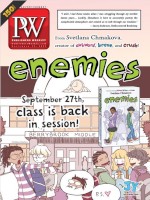In Untangled (Balance, Nov.), Buddhist monk Paley Ellison outlines how to follow Buddhism’s eightfold path.
Can you explain what you mean by “practice itself is enlightenment”?
It sounds esoteric, but what I love about this teaching is that it’s really saying our practice of being alive is how we wake up spiritually. We can experience the freshness of living by attending to what we’re experiencing—when you wake up in the morning and feel the temperature on your skin or stand up to get out of bed and realize that you’re standing up and getting out of bed. Enlightenment is such a misunderstood thing. People think of it as being on some desert island and feeling blissed out, but it’s just that exquisite freshness of experiencing reality.
You write about the ability of personal stories to “tangle” up one’s life. Can you elaborate on that?
Once, I was in the kitchen with my husband and he was blocking my path to the refrigerator, and I felt myself turn into Godzilla because I was telling myself this story that he was deliberately getting in my way and not allowing me to have the nourishment I needed. In the amount of time it takes to snap my fingers, I became this raging human, but then I realized, oh, I can just touch his hips and move him and get into the fridge. The tangle is when we start to believe that story of being blocked, that this person is terrible and on and on until they become a cartoon and we’re all knotted up in this story we’re telling ourselves. Most of the stories I tell myself tend to skew negative or critical. They’re so familiar, but not so helpful or nourishing, and so it’s important to be aware of the reality of the situation.
You mention the idea of “nourishment.” Can you expand on that?
We think about nourishment in terms of food, but to me, it’s a wonderful lens to think about our thoughts and words. Are these nourishing words? Are they creating solutions? Are they honoring our experience? We need the nourishment of good friends; not all of us can have a nourishing birth family, but we can all develop nourishing relationships. Talking about “health” can become abstract but talking about what’s nourishing brings you back to experience and the body.
What’s the first thing you hope readers do after finishing your book?
Take a good, deep breath in their belly and begin to reflect: What is my life? What can I do to begin cultivating nourishing relationships with myself and others in this world? My wish would be that people begin to say, well, what is possible?



 Volume 269
Issue 38
09/12/2022
Volume 269
Issue 38
09/12/2022





